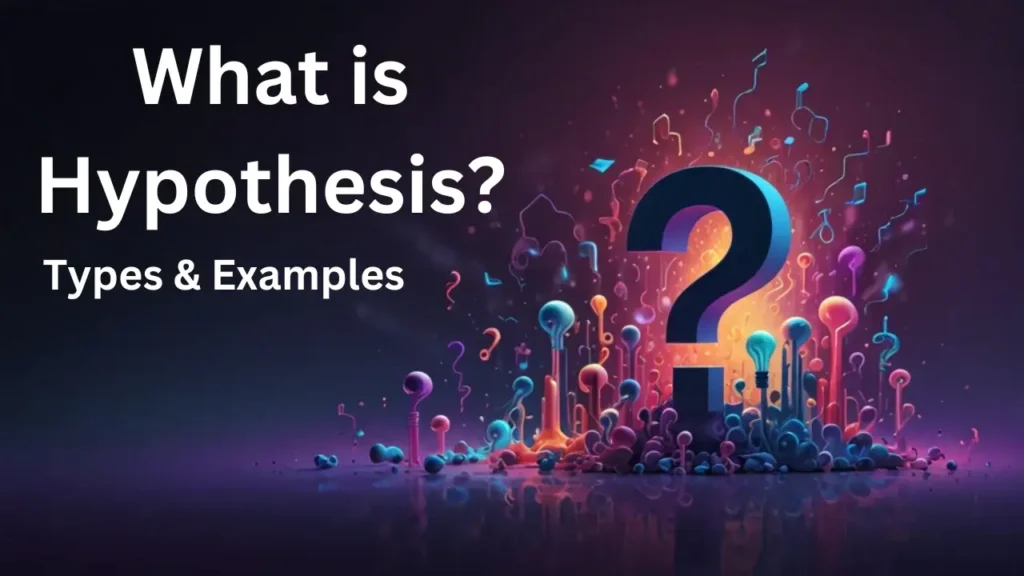Before explaining types of hypothesis, it is essential to know first what is hypothesis?
Defining Hypothesis
A hypothesis is a logical assumption, a reasonable guess, or an educated speculation. It offers a preliminary explanation for a phenomenon being studied as it directs the research.
1. A hypothesis is a statement that can be true or falls on the basis of an experiment.
2. By George: Hypothesis is tentative justification the validity of which remains to be tested.
3. By Kerlinger: A hypothesis is a causal relationship between two or more variables.
Characteristics of Hypothesis
- A hypothesis is a prediction about the outcome of a study.
- It focuses on the possible relationship between at least two variables.
- The hypotheses are formulated in a manner that can be tested.
- It merges rationalism and empiricism.
- It has an advantage of using a logical argument based on observation.
- It helps to reevaluate our position in case we may find that our hypothesis is not supported.
Importance of Hypothesis in Research

Guiding and Collecting Relevant Data
A hypothesis is essential as it provides direction for the research. An investigator can use the hypothesis to guide his/her thinking and find solutions to the research problem or sub-problems. The hypothesis guides an investigator to gather the necessary data for investigation. Hypotheses are important as they assist investigators in finding the necessary information to address the research problem or sub-problems.
Test Theories
However, our observations may provide support for the hypothesis being tested. In science, the purpose of testing hypotheses is to reach or test a theory – an organized system of assumptions and principles that aims to explain specific phenomena and their relationships. Theories are valuable tools for organizing and explaining the data collected in research studies. In simple, theories help us create a framework for understanding the facts within a specific field.
Development of Theories
A hypothesis is a prediction about the outcome of a single study. Multiple hypotheses can be examined and numerous research studies can be conducted before a comprehensive theory on a topic is presented. Once a theory is developed, it can help in generating future hypotheses. Further, researchers may have more questions about the theory that assist them in formulating new hypotheses to examine. If the results from these investigations continue to support the theory, it is highly probable that our confidence in the theory will increase. However, additional research can also uncover flaws in a theory that may necessitate future revisions.
Types of Hypothesis
There are the following types of hypotheses such as; Simple hypothesis, Complex hypothesis, Empirical hypothesis, Null hypothesis, Alternative hypothesis, Logical hypothesis, and Statistical hypothesis.
Simple Hypothesis
A simple hypothesis is one of the types of hypothesis in which there exists a relationship between two variables one is called the independent variable and the other is called a dependent variable.
Example: Higher the education level there will be lower levels of crime.
Complex Hypothesis
A complex hypothesis is one in which relationships among different variables exist. In this hypothesis, dependent as well as independent variables are more than two. To make complex hypothesis, there should be moderating and mediating factors.
Example: The impact of social media on mental health and academic performance can be influenced by the duration of online activities and the quality of online interactions.
It shows that the impact of social media is indirect and can be influenced by various factors.

Empirical Hypothesis
A working hypothesis is that one is applied to a field. During the formulation, it is an assumption only but when it is part of a test it becomes an empirical or working hypothesis. It is based on evidence. It comes to existence when theory is being tested by using observation and experiments.
Example: Higher the levels of income inequality is correlated with higher crime.
Null Hypothesis
The null hypothesis is also one of the types of hypothesis that contradicts the affirmative statement of a working hypothesis. Based on the null hypothesis, there is no connection between the dependent and independent variables. HO is the symbol used to represent it.
Example: Students who study 10 hours a week and those who study 5 hours had similar average exam results.
Alternative Hypothesis
Firstly, many hypotheses are selected then among them select one which is more workable and most efficient. It is denoted by HI. The formulation of an alternative hypothesis is a tradition in scientific circles. Its main function is to specify clearly the relationship that will be considered true in case the research hypothesis proves to be wrong. In a way, an alternative hypothesis is the opposite of the research hypothesis. In other words, an alternative hypothesis is an opposing theory to the null hypothesis.
Example: Students who study more tend to achieve higher marks than those who study less.
Statistical Hypothesis
A statistical hypothesis is also known as confirmatory data analysis. This hypothesis can be tested by observing a process modeled by a set of random variables. A statistical hypothesis test is a fundamental tool in statistical implication. Typically, an artificial data set from an idealized model is compared to a data set obtained through sampling, or two statistical data sets are compared. A hypothesis is proposed to examine the statistical relationship between the two data sets, which is then compared to an idealized null hypothesis that suggests no relationship between the data sets.
Example: Average test scores of students using a novel teaching approach are significantly different from those using a traditional approach. This is a statistical hypothesis as it claims population parameters, i.e., two groups’ mean test scores.
Logical Hypothesis
A logical hypothesis is a suggested explanation supported by some evidence. Typically, it is important to transform a logical hypothesis into an empirical hypothesis by subjecting your theories or postulations to testing. A hypothesis that can be verified through logical reasoning is referred to as a logical hypothesis. Therefore, in the absence of concrete evidence, it is suggested by logical hypothesis that there is a potential connection between the variables. For instance, it is highly probable that dinosaurs closely related to alligators had green scales, given that alligators themselves possess green scales.
Example: If you spend more money on education there will be higher economic development.

Working Hypothesis
A working hypothesis is a temporary assumption that acts as a foundation for further investigation. It is a statement that can be tested and offers a potential explanation for a phenomenon or the connection between variables. Unlike a theory, a working hypothesis is flexible and can be adjusted as needed to guide the collection of data and the design of experiments. The term “working” suggests that the hypothesis is still being developed and may be subject to changes or rejection as new evidence emerges. Working hypotheses are usually used in exploratory research to guide the investigation and propose potential lines of inquiry.
Example: Higher use of social media decreases face-to-face communication among young adults.
It is tentative assumption that need to be tested through research.







Easy & authentic material 💐